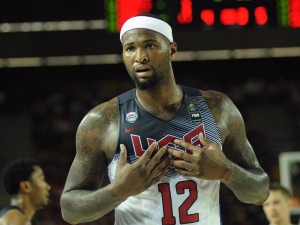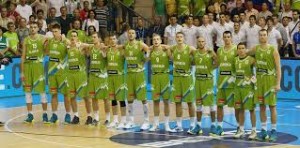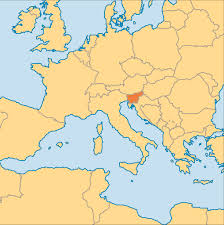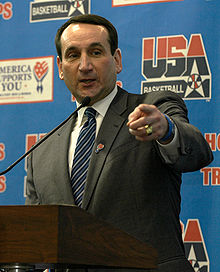
 BARCELONA — A reporter from Slovenia asked DeMarcus Cousins a question Monday: “Do you know where Slovenia is?”
BARCELONA — A reporter from Slovenia asked DeMarcus Cousins a question Monday: “Do you know where Slovenia is?”
Cousins snapped back: “Do you know where Alabama is?”
Touche.
The reporter was undoubtedly pursuing the storyline of “They don’t respect us, they don’t know us, they don’t even know where our country is located.” It is as predictable of a storyline as you could imagine, but Cousins was not taking the bait.
So make that two big days in a row for the big man (he was 5-for-5 against Mexico), whose role with Team USA should increase substantially this week as the World Cup moves into the quarterfinals, then the semifinals, and finally the gold medal match on Sunday in Madrid.
I have already chimed in about how Cousins is my choice for the most important player on the U.S. roster over the next six days, and whether the Americans can defeat Spain in the gold medal game will largely depend on how much cohesion and chemistry coach Mike Krzyzyewski can develop over the next two games. The only way to do that is to shorten the rotation, divvy up the 200 minutes of playing time among eight guys, and smoke the competition. (The Americans’ semifinal opponent on Thursday will be Turkey or Lithuania.)
 Slovenia has no chance, OK? The Americans already played them once and beat them by 30. The betting line is 25. The Slovenians wear chartreuse colored uniforms. Boki Nachbar is not on the team. Goran Dragic is, as is his brother, Zoran. Those two are good. The rest? Not good enough to stick with the USA for a full 40 minutes.
Slovenia has no chance, OK? The Americans already played them once and beat them by 30. The betting line is 25. The Slovenians wear chartreuse colored uniforms. Boki Nachbar is not on the team. Goran Dragic is, as is his brother, Zoran. Those two are good. The rest? Not good enough to stick with the USA for a full 40 minutes.
So a few notes to entertain you as the hours count down to tipoff. And a word of advice: When FIBA says the game will tip at 3 p.m. ET, they aren’t kidding. If you turn the TV on at 3:01, the game will have already started.
_ The USA and Slovenia (5-1) clashed in Gran Canaria on Aug. 26 in an exhibition game that the Americans claimed, 101-71. The two nations have met in the last two FIBA World Championships, and the USA collected a 99-77 win in 2010 and a 114-95 victory in 2006. Slovenia is led by the Dragić brothers, Phoenix Suns standout guard Goran Dragić, who is scoring 16.5 ppg., and guard Zoran Dragić, who is adding 13.2 ppg. Also, guard Domen Lorbek is adding 11.5 ppg., Jure Balazic is contributing 8.5 ppg., and 7-foot center Alen Omić averages 8.3 ppg. and a team leading 5.8 rpg.
 _ SLOVENIA
_ SLOVENIA
FIBA World Ranking: #13
How Slovenia Qualified: FIBA Europe 5th place (7-4)
World Cup Appearances: 2
World Cup Overall Record: 7-8 (.467%)
World Cup Finishes: 8th (2010); 9th (2006)
World Cup Record vs. USA: 0-2 (77-99, 2010; 95-114, 2006)
Last Senior Team Meeting vs. USA: 2014 MNT Tour (71-101)
_ WINNING MARGINS
Since the USA National Team program was taken over by managing director Jerry Colangelo and coached by Mike Krzyzewski, USA teams have won 49 of 50 games. The margin of victory for those 49 victories:
50 or more points 5 times
40-49 5 times
30-39 13 times
20-29 14 times
10-19 8 times
0-9 4 times
 Under Krzyzewski, defense has been a mainstay in the formula for success. Below is the listing for points each USA team allowed its opponents, and the opponents’ overall field-goal percentage.
Under Krzyzewski, defense has been a mainstay in the formula for success. Below is the listing for points each USA team allowed its opponents, and the opponents’ overall field-goal percentage.
2014 WC 68.0 ppg. .386
2012 OLY 74.5 ppg. .454
2010 WC 68.2 ppg. .381
2008 OLY 78.4 ppg. .403
2007 FAC 77.2 ppg. .379
2006 WC 83.1 ppg. .462
USA National Teams have limited their opponents to 79 or fewer points in 31 of 50 official games under Krzyzewski. On five occasions opponents have broken through the 100-point barrier. Greece scored 101 points in the USA’s lone loss (101-95) in the 2006 Worlds. Spain has hit the century mark twice in Olympic gold medal games (107-100 in 2012, 118-107 in 2008) but lost both times; Mexico tallied 100 in a 2007 FIBA Americas Championship preliminary round loss (127-100); and Puerto Rico hit the mark in a World Championship.
_ YOUTH
The USA’s 2014 World Cup Team averages out at just 24.08 years of age, the youngest USA World Championship Team ever using NBA players and the youngest team since collegians were used in 1990. Both the USA 2010 and 2006 teams averaged 24.58 years of age, the 2002 team was 26.25 years old on average, the 1998 squad was 27.83, and the 1994 team was 26.33 years old, while in 1990 when collegians were used the team averaged 20.08 years of age.
(MORE: COMPARING TEAM USA AND TEAM SPAIN, POSITION BY POSITION)
Chris Sheridan is publisher and editor-in-chief of SheridanHoops.com. He has covered every senior U.S. national team since the 1996 Atlanta Olympics. Follow him on Twitter.
Isn’t Turkey, not Austrailia, the other possible semi-final opponent?
Fixed. Nice catch
That Turkey-Australia game was a pretty damn good one btw!!! The only reason I knew that was because I had in on watchespn in the library… Talk about a study distraction….